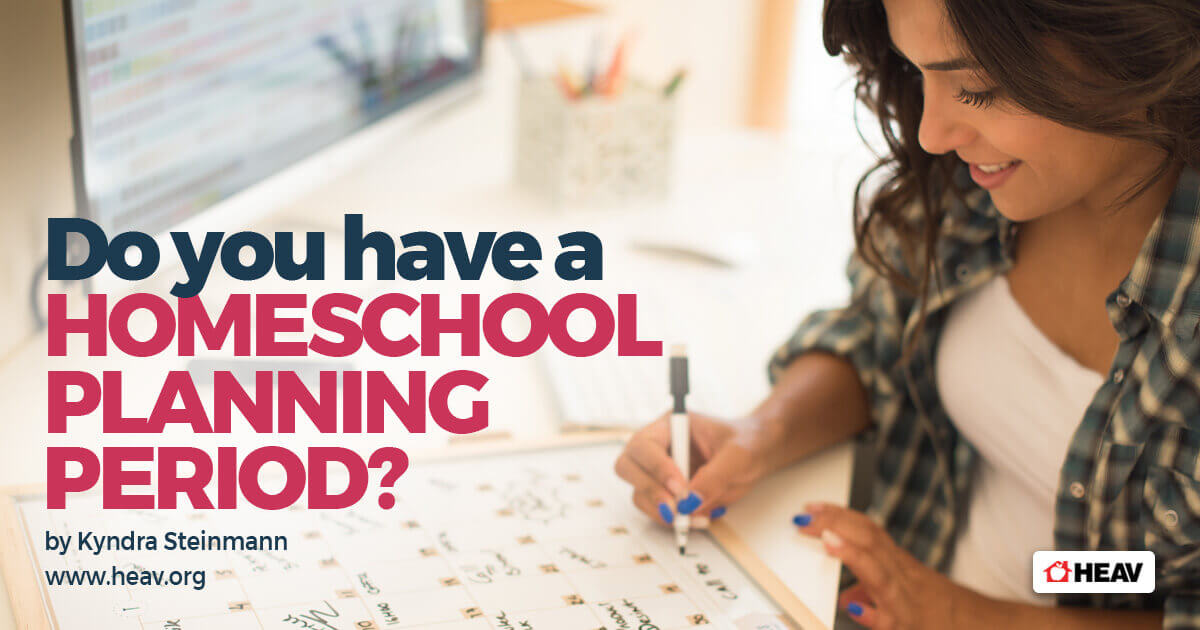Do You Have a Homeschool Planning Period?
by Kyndra Steinmann
The first six weeks of our first term of school flew by! We took a week’s break—to work on other projects, to do some of the cleaning and organizing that never seems to happen during the school term, and to allow me to finalize the lesson plans for the next term.
Over the summer, I had done a basic sketch of what we would do when, but with six weeks of school accomplished, I now knew where I needed to tweak things.
For example, our first lesson every day is 20 minutes of handwriting. I had planned for each child to do about two pages a day in his handwriting book, which meant that the subject would last all year. Some of the children have been extra diligent and are nearly done with their books, so I needed to decide if I would purchase the next book for them or choose a different subject to fill that space.
I also needed to purchase new math books for two of the children as they had progressed more quickly than I had expected there as well.
No major changes, but enough little tweaks that I wanted to spend some time on them rather than try to squeeze them into my weekly planning period, since that time is already marked for looking at the coming week’s lessons.
The tasks for a planning period:
- Look at last week’s assignment sheets, making sure everything was completed, and writing any notes I might have on behavioral issues, someone being sick, or lessons being unexpectedly difficult or easy. I staple the four assignment sheets together along with any tests or other graded work and file them by month of the year. At the end of the term when I do report cards I pull these files, note anything that was late, undone etc. and figure that into the grades.
- Make new assignment sheets. I look at the lessons and enter page numbers onto the sheets while making a note to myself of anything that might be difficult or that someone may really not want to do. I also try to see if there are any extra materials that might be needed for science, or anything that I may need to print (like maps for history). I print the assignment sheets and put them on each child’s clipboard.
- Print anything that they may need that isn’t already printed. Any papers that they need to add to a notebook or binder are printed and put under the assignment sheet on their clipboard.
- Collect any other materials and put them where I can find them easily and the toddler can’t.
- Restock the toddler’s and the five-year-old’s cutting and gluing trays with paper and glue. They seem to always run out in the middle of a critical lesson, so I try to do this ahead of time.
- Make sure all the school stuff was returned to the right place at the end of the week, lest I hear the dreaded wail, “I can’t find my math book!
Most weeks this “prep-work” takes me about 90 minutes, and it makes the whole week run more smoothly. I make the majority of my decisions about schoolwork at one time when I’m in “the zone,” and I am then able to use the energy that I would be putting into making decisions on the fly into teaching lessons, working with children to improve their attitudes, keeping my calm when the toddler spills all the crayons, and so on.
When to have a planning period:
My planning period is one of my weekend priorities. It ranks on the list of things to do right next to “go to the store so we have food to eat next week.” After all, feeding minds and hearts is as important as feeding growing bodies, and without some time to plan, I can’t do any of it! Generally, I do my planning on Sunday afternoon while everyone else is napping or having quiet time. I have a cup of tea, gather my books, and sit at my desk in a (mostly) silent house.
Homeschooling can be mentally draining, and some days I am not “in the mood” to think about another week of school, so I have to substitute intention for desire. I block social media on my computer for 25 minutes—and on my phone as well!—and open the first book. Often I find that the Holy Spirit blesses my effort, and by the time I have finished the assignment sheets I am looking forward to a new week.
Some weekends are a bit busier, or I need to nap myself, and I then shift my planning period to Sunday evening— or even do part of it then and finish on Monday afternoon after co-op. If I do that, I try to have all of the thinking parts finished before bed on Sunday evening and simply do the printing and organizing of books on Monday, since those afternoons can be somewhat unpredictable.
I look at this time as a way of re-energizing and encouraging myself to continue homeschooling, as well as a time to reflect some on what has and hasn’t been working. Sometimes I decide that things just need more time, and sometimes I decide that the subject is one that a particular child finds difficult and that we need to keep pressing forward as it is helping him or her to strengthen weak areas that they tend to avoid. I do write down brief notes on what subjects seem to trigger the most anxiety or frustration and keep a rough tally of whether things are improving or not. Without that written record, I find I am making decisions based on how I feel about any particular week, and I need to planning time to really see if there is a problem requiring a complete change of direction or simply a difficulty that needs to be surmounted.
Some people find that planning works better for them in small doses throughout the week. Others try to wrap up all school-related activities on Fridays. The most important thing is to take that time, prepare for the new week, lay it before the Lord in prayer, and trust Him to bless the effort.
Kyndra Steinmann blogs at Sticks, Stones and Chicken Bones about living in a houseful of young children, special needs, discipling hearts, and abundant grace! As a homeschool graduate, she has an especial burden to encourage mothers to know and enjoy their children. Follow her on Sticks, Stones & Chicken Bones, Facebook, and Pinterest.









